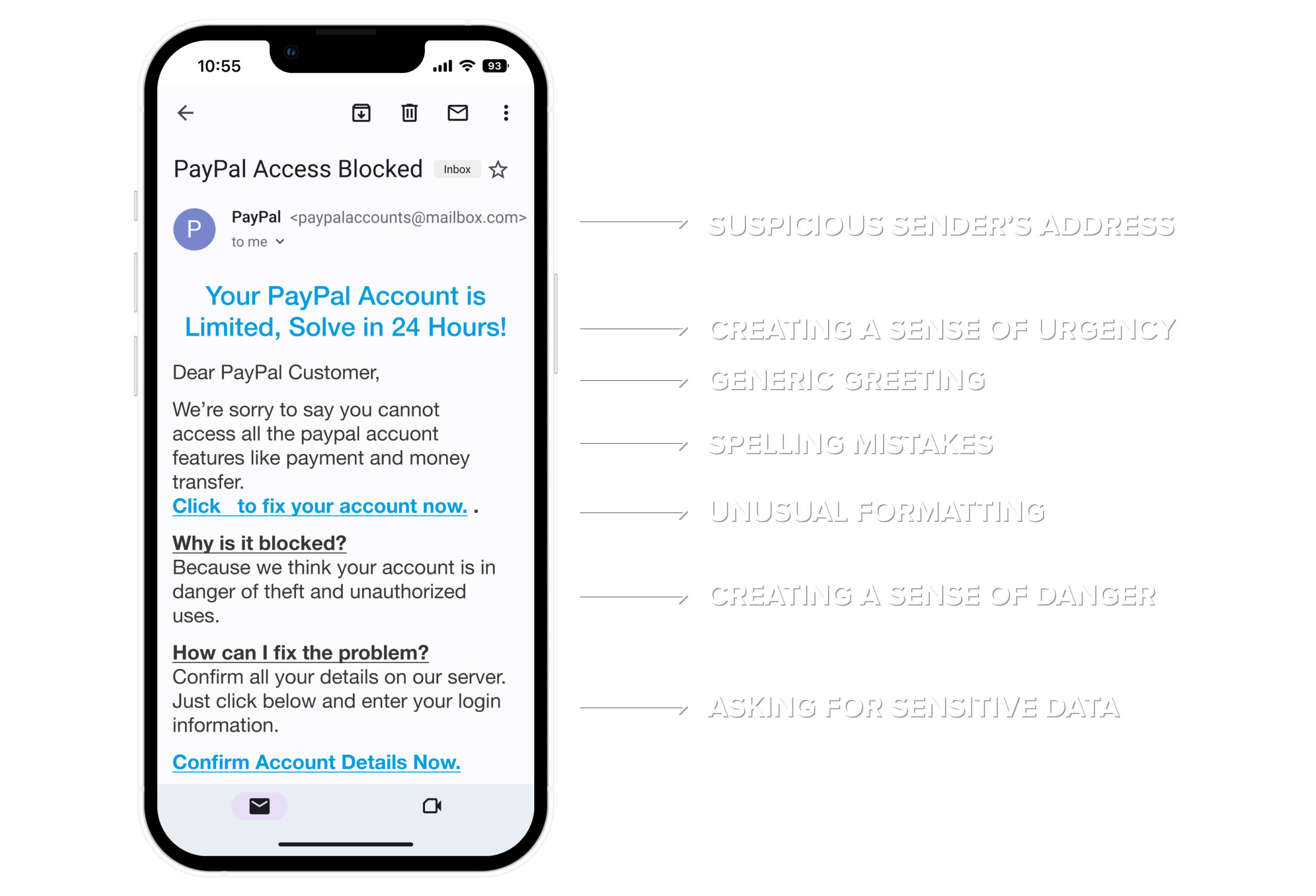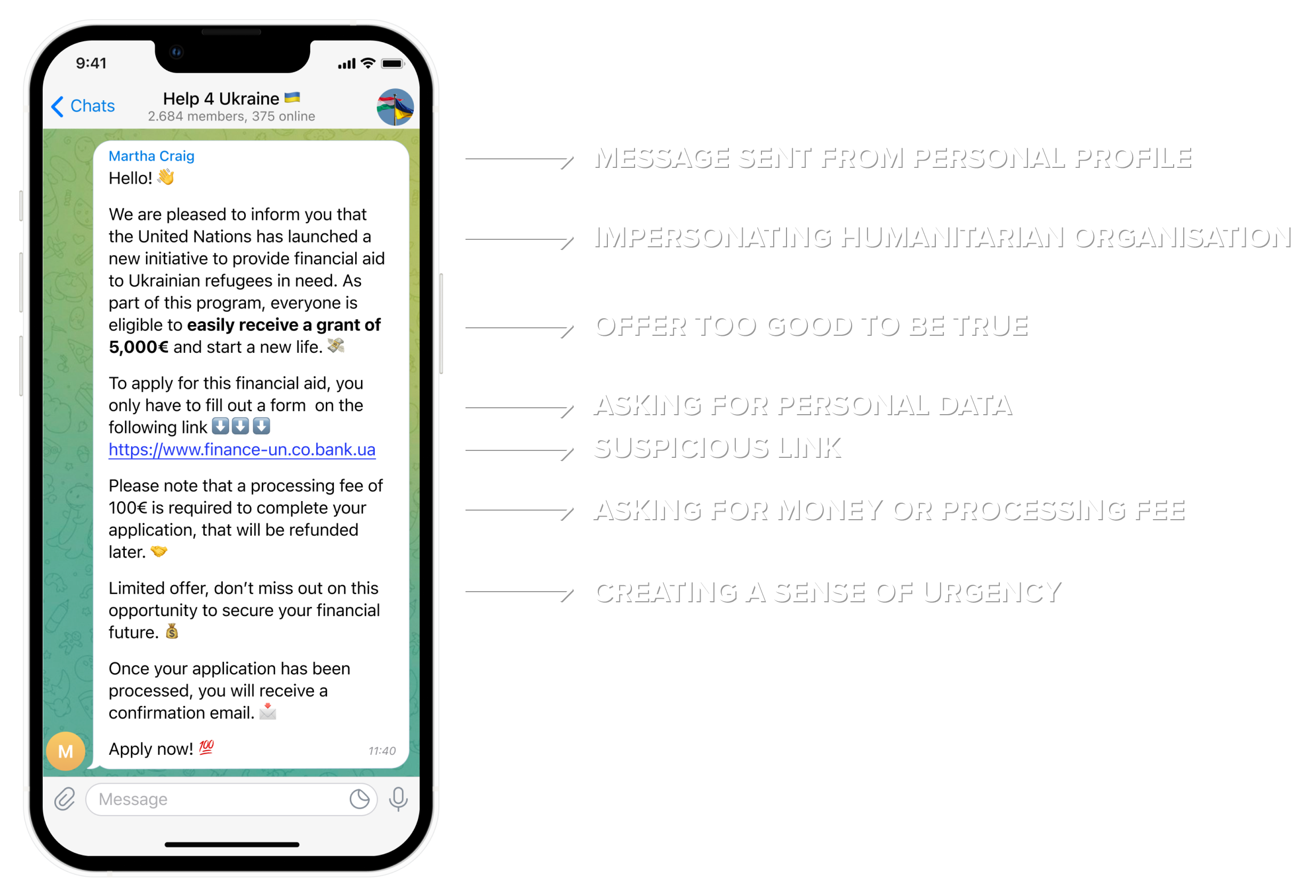Recognise scams and phishing attempts
Online scams have become part of our daily life
Online scams and phishing campaigns are deceptive strategies used by cybercriminals to obtain sensitive information or money. They can range from large-scale phishing campaigns targeting a broad audience to more personalised scams shared in online communities or sent via private messages. These practices are designed to exploit your need for information, assistance, and security. Understanding the nature of these threats and how to recognise them is crucial for your online safety.
To avoid scams, you should always…
- Avoid clicking on links in emails and messages, especially when they come from unknown or suspicious sources.
- Directly type in the URL of well-known sites like your bank or utility providers instead of following links.
- Double-check the sender's email address and domains to ensure they align with the legitimate organisation's contact details.
- Be careful with urgent and unexpected requests that involve your personal or account information, as they can often be attempts to create unnecessary panic for quick compliance.
- End calls from unknown numbers and independently look up the official customer support number to verify legitimacy.
- Maintain a healthy skepticism towards offers that seem overly favourable or too good to be true, as they often indicate scams.
- Recognise if an offer is written with grammatical errors, awkward sentence structures, and strange formatting.
You are targeted by scams and phishing through…
Emails and text messages
Scammers send bulk emails or messages that mimic legitimate offers or alerts, aiming to reach a wide audience quickly.
- ? Sender address mimic legitimate organisations with slight variation or unfamiliar domain names.
- ? Lack of personalisation in the message.
- ? Creating a sense of emergency to provoke quick action.
- ? Asking login to your account or for sensitive data like passwords or bank details.
- ? Claiming you've won a prize or reward, especially if you don’t remember participating in any contest.
Phone calls
Direct phone calls from individuals posing as authorities or service providers (most commonly banks), attempting to extract personal or financial information.
- ? Seeking sensitive data over the phone.
- ? Creating stress to make you act without thinking.
- ? Using intimidation to elicit immediate responses.
- ? Asking you to download an application so they can “assist your further”.

Paid advertisements in social media or search engines
Ads appearing as sponsored posts or top results in search engines mimic legitimate offers but lead you to fraudulent websites.
- ? Too-good-to-be-true offers.
- ? Directing to websites with weird domains, that are not well-known or secure.
- ? Offers of easy financial gain with little effort.
Private messages
When you are a member of refugee-focused online communities, scammers use private messages to send personalised scams, often based on information gleaned from public profiles and using fake profiles.
- ? Messages from individuals not connected or known to you.
- ? Being overly friendly, despite never met before.
- ? Asking you to complete simple tasks for money.
- ? Quickly promoting and redirecting to websites.
Offers in online communities
Particularly prevalent are fake offers of humanitarian assistance, which target vulnerable individuals with seemingly helpful proposals.
- ? Redirecting to websites that are not officially affiliated with known organisations or to banking sites.
- ? Offers that come with strings attached, like paying a commission fee.
- ? Using the identity of the UN or other large organisations.
- ? Trying to gather sensitive information under the guise of help.

Scams and phishing are leading you too…
Copycat banking websites
If you've clicked on a link resembling your bank's website, you might unknowingly enter your login details on a copycat banking site. This action can lead to the loss of your banking credentials, allowing scammers to access your accounts and funds.
- ? Slight differences in the web address from the legitimate site.
- ? Asking you to log in without a legitimate reason.
- ? Only having a login page of the bank, but nothing else.
- ? Using unsecure connection – showing no ? in the address bar.
Fake humanitarian websites
Websites that are designed to look trustworthy, prompting you to share personal information, possibly including sensitive data like your immigration status, family details, or financial information. Once in the hands of scammers, this information can be used for identity theft, fraud, or even sold on the black market, exposing you to ongoing risks.
- ? Unusual web address, not hosted under the organisation’s official domain.
- ? Excessive requests for sensitive information.
- ? Lack of legitimate contact details for the organisation.
- ?Absence of recognition or endorsement from known entities.
Cryptocurrency and investment platforms
These scams are designed to lure you into transferring money or investing in nonexistent opportunities. The allure of quick wealth can be tempting, but these schemes result in substantial financial losses, as the scammer disappears with your funds.
- ? Promises of unusually high returns on investment.
- ? Pushy tactics trying to get you to invest quickly.
- ? Absence of verifiable financial data or transparency.
- ? Excessive use of well-known organisations, like listing “trusted partners”.
Phishing websites of popular services
Phishing websites are deceptively designed to extract your account credentials and personal information. They usually copy popular websites like Netflix or a utility provider, but in reality, you are handing over your details to cybercriminals.
- ? Redirected from emails or messages to “verify your account”.
- ? Web addresses that do not match the official service’s URL.
- ? Asking for information that the genuine service would not require.
Misleading 'Easy Rewards' games
Some scams entice you with games or applications offering easy rewards, bonuses, or money. These might require an initial payment or ask you to complete tasks for rewards. However, the promised returns are usually fictitious, and you may end up spending money without any real benefit, leading to financial loss and frustration.
- ? Asking to make in-game purchases to progress or receive the promised rewards.
- ? Process to redeem the rewards is overly complicated or unclear.
- ? Filled with excessive ads.
- ? Asking for extensive personal details.



